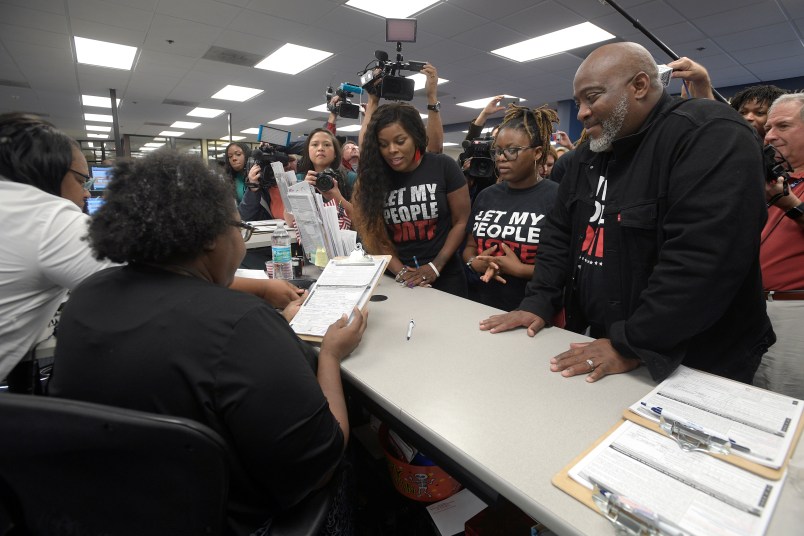Florida’s restrictions on ex-felon voting will likely remain in place at least for August’s primary, after the Supreme Court on Thursday refused to remove a hold on a trial judge’s ruling that those restrictions are unconstitutional.
The Supreme Court’s action in the case, where the voting rights of hundreds of thousands ex-felons could be at stake in the swing state, is the latest example of the conservative majority siding with restrictive laws.
Though the Florida case is not technically linked to the pandemic, in several other recent disputes where voter access in the outbreak was in play, the Supreme Court has consistently sided with keeping in place the more restrictive voter regimes.
“This Court’s inaction continues a trend of condoning disfranchisement,” Justice Sonia Sotomayor said in her dissent to the Florida matter, as she referenced the so-called “Purcell” principle instructing courts to avoid injecting chaos in the lead-up to the elections.
“Ironically, this Court has wielded Purcell as a reason to forbid courts to make voting safer during a pandemic, overriding two federal courts because any safety-related changes supposedly came too close to election day,” she wrote. “Now, faced with an appellate court stay that disrupts a legal status quo and risks immense disfranchisement—a situation that Purcell sought to avoid—the Court balks.”
The case involves a law Florida Republicans passed in 2019, after the state’s voters in 2018 approved a constitutional amendment giving certain ex-felons the right to vote. The 2019 law requires that those ex-felons pay back all remaining court fees before they regain the franchise. The law’s challengers say that the mandate amounts to an unconstitutional poll tax.
Florida suffered several setbacks in court defending the restriction, culminating in a May ruling by trial judge in Tallahassee striking down parts of the law on the merits. That ruling came several months after the judge had partially blocked the law in a preliminary manner.
Using an unusual procedural tactic, Florida turbo-charged its appeal of the merits ruling last month to get it quickly before the full 11th Circuit U.S. Court of Appeals, which President Trump recently flipped to a majority GOP appointees.
Earlier this month, the 11th Circuit put a hold on the ruling, effectively reviving the restrictions at least for the August primary and possibly for November. After the legal challengers asked the Supreme Court to intervene and remove the hold, the court on Thursday said it would not.
In addition to their failed Supreme Court bid, the law’s challengers are now also trying to get three of the appellate judges recused because they were either involved in the state court proceedings over the law or in another related case before joining the the 11th Circuit.
Of the more than 1 million ex-felons who otherwise gained the right to vote under the 2018 ballot initiative, three-quarters of them face financial obligations that, according to the 2019 law, prevent them from registering or voting if left unpaid.
What the trial over the law made clear is that Florida election officials still had not figured out a way of implementing the the restriction, as keeping track of these court fees is a Kafka-esqe endeavor in the state.
In voting to deny the request that they intervene did, the unnamed majority did not explain the move to let the hold remain in place. Justices Ruth Bader Ginsburg and Elena Kagan joined Sotomayor’s dissent, but it’s possible that another justice may have dissented privately.
Read the order with Sotomayor’s dissent below:



